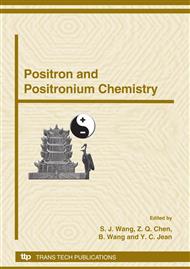p.204
p.207
p.210
p.213
p.218
p.223
p.227
p.232
p.235
Freezing of Nanodroplets: Phase Transition of Organic Liquids Confined in Nanopores Studied by Positron Annihilation Spectroscopy
Abstract:
Behavior of solids and liquids confined in nano domain has great relevance in fundamental research as well as applications in nanotribology, nanofabrication, membrane separation, interfacial adhesion and lubrication. In this work, we have studied phase transition behavior of different organic liquids confined in nanopores of ZSM-5 zeolite and silica using temperature dependent positron annihilation Doppler broadening and lifetime spectroscopy. It is observed that the freezing and melting properties of liquids confined in nanopores are different from their bulk behavior. The liquid molecules (isopropanol) that feel more attractive interaction with the pore wall show an increase in freezing temperature. Similarly, a liquid like benzene which is weakly attractive with pore wall as compared to its solid phase show a decrease in its freezing point under confinement. The confining pore diameters are in the range of 10-60 Å. It was observed that the shift in phase transition temperature does not follow classical Gibbs-Thomson relation.
Info:
Periodical:
Pages:
218-222
DOI:
Citation:
Online since:
November 2008
Authors:
Price:
Сopyright:
© 2009 Trans Tech Publications Ltd. All Rights Reserved
Share:
Citation:


